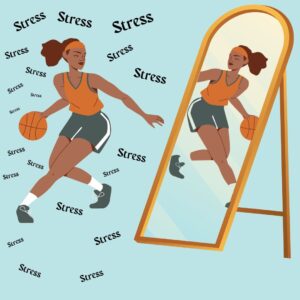Ask the Mind
BY ALEXIS MCCAFFREY, STAFF WRITER
Have you ever felt that rush of adrenaline before a game where you can feel your heartbeat beating so loud that everything else around you goes mute? Just for a moment, you find yourself in a place of excitement and fear for the game you are about to play. Playing sports on a competitive level such as college can be mentally stimulating and challenging.
“Lifting, training, eating, whatever it takes to get better as a competitor is done and sometimes there is very little success to show for it. The life of an athlete is putting your all into something and not guaranteeing the results, but those feelings of stress get in the way of performance and must be overcome. It might not be healthy but it’s how it is often treated” stated Gabe Gibson, a sophomore club football player.
Chase Tucker, a sophomore, and athlete for Mason’s basketball team explained his thoughts on mental health and how it works in athletics. “Mental health works into being an athlete because the importance of sports in your life has an effect on how you view yourself and view the world around you and when you better understand the sport you play and why you play it and the effect that sport has on you, you can better your mental health.”
The importance of athletic performance is built from one’s foundation of mental health. The need for there to be space to talk about it is evident.
I think mental health is a very important aspect of the sport that isn’t talked about much but your mental health definitely affects your performance on and off the court. So I think it’s an important aspect that should be talked about more” said Tucker.
As an athlete and member of an athletic team, it’s key to check in and be there for one another whether that’s before a game or after, just be there.
“We don’t currently have a system for better mental health before games, however, we are a very close team and we always check on each other. It doesn’t have to be a set time, necessarily if one of our brothers/ teammates are struggling with something I am going to ask them about it. We check in on each other to make sure we are not struggling with anything” said Tucker.
Mason has helped student-athletes by providing them with CAPS resources and mental health sessions with various foundations such as the Hillinksi’s Hope Foundation; aiming to educate and bring awareness to mental health issues student-athletes can struggle with. Most of which were centered around the fact of destigmatizing asking for help and seeking out therapy.
“I think the biggest way Mason can help athletes is by acknowledging that mental health is a thing and that is the way it affects your ability to play and even more important, your life,” said Tucker.
